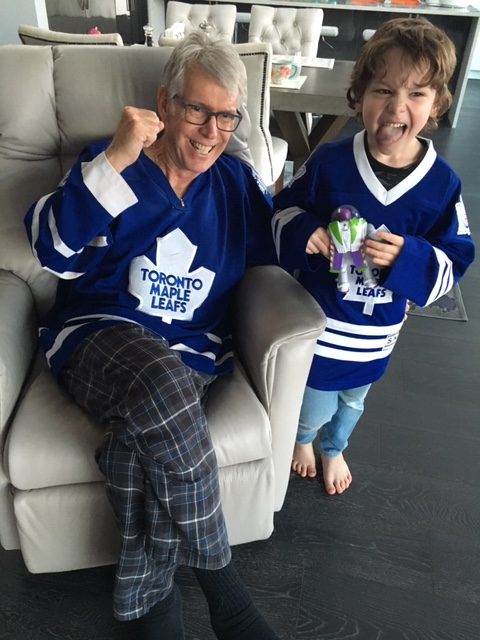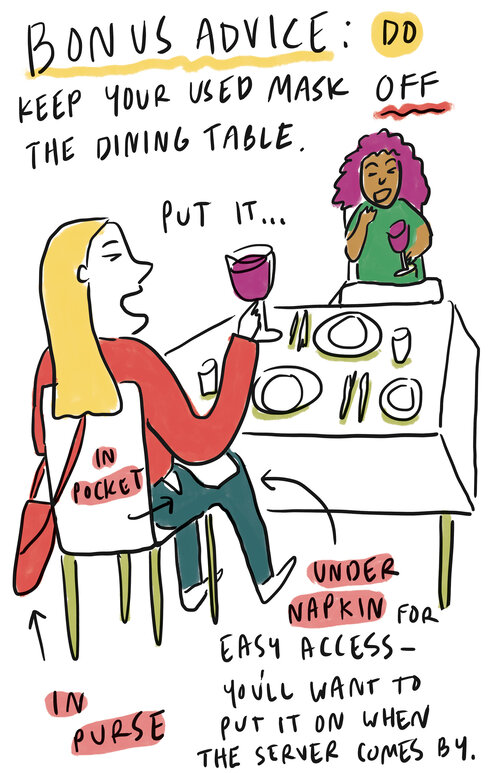Just a thought… Civility costs nothing, but buys everything. [Mary Wortley Montagu]
Well hello! Are you hockeyed out yet? I shared this picture on Facebook and other social media Friday. They were both in their jerseys yesterday, too. What a lovely tradition – however short- or long-lived!

Things are going well and smoothly here with our lovely family live-in. Colin has had his first play date with two boys who are grandsons of a dear friend, and we went to the ocean on a partly cloudy 22 degree day. I kept saying to Nancy, “You envisioned this: you said one day Colin and your two boys would be playing together and here they are. How is this even real?”
What’s also very real these days is the fact that BC is not as smug about being a shining light in COVID numbers for all of Canada and to the US. As more young people decide they can get their party on and not feel vulnerable, our numbers are on the upswing. According to an article at cbc.ca:
In the past month, the number of daily active cases in the province has quadrupled from about 10 a day to more than 40. The number of active cases has more than doubled, reaching levels not seen since May. Outbreaks are now widespread enough to require the self-isolation of more than 1,500 British Columbians. There are now more active cases per capita in B.C. than Ontario. In other words, it’s not good.
No, it is not. While my dad and many others are either forcibly or voluntarily self-quarantining, the selfish and brainless among us are putting everyone at risk. It’s not fair, and it’s sure not right.
So, what to do? When we’re out in grocery stores and see people not wearing masks, we find ourselves trying not to judge or be indignant, but it’s hard. So when I found this article on npr.org on etiquette and how to deal with (or not deal with) people who won’t respect the masking requests, I thought it was well worth passing along to you today. The article, by Malaka Gharib, refers to advice from etiquette expert Elaine Swann.
Maybe you’ll find some wisdom in here worth sharing or tucking away. We sure did. While etiquette isn’t the first thing that comes to mind in the midst of a pandemic, it comes down to decency and civility and how to manouevre choppy and uncharted waters, even if they’re in the paint section of your local Home Hardware. (The takeaways at the end of each point are especially helpful.)
1. How do I tell somebody — especially a stranger — to step back because that person is just too close to me?
Swann says this is the No. 1 question people ask her. Your first inclination is to yell out, “Step back!” or “Get up off me!” she says — but those reactions aren’t exactly polite, and they’re likely to escalate the problem.
Instead, she says, try to use words like “we” and “us” in the request. For example, “Let’s just put a little bit of space in between each other while we’re waiting in line.” This shows mutual consideration — you’re thinking about how your behavior is affecting their health — and hope they are concerned with your safety too.

Malaka Gharib/NPR
If you ask in a kind manner, people are likely to do as you ask, says Swann. More often than not, people want to be respectful of others.
But if you start lecturing about pandemic safety or take on an abrasive tone, they might not be as willing to comply. They might “feel like they’re being chastised” or perceive your request as an attack on their moral character — that they are someone who does not follow rules. That might offend the person or make them feel defensive — and ultimately, the person might refuse your request.
Takeaway 1: Show mutual consideration.
2. What if I ask a person to keep their distance or put on their mask — and they say no?
“Then, do what you can to protect yourself,” says Swann: Turn your face away from that person, step over a few feet, walk in a different direction.
Takeaway 2: Protect yourself.
3. It makes my blood boil when I see people not following the pandemic guidelines. Can I intervene?

Malaka Gharib/NPR
“If their behavior is not affecting you, let it go,” she says. “Folks are getting into these arguments and kerfuffles because they’re trying to get folks to comply with the pandemic guidelines. Stop trying to do that if the person does not want to comply. You have to let crazy be crazy and leave them alone.”
The only time you should speak up, she says, is if it’s directly affecting your safety. Then you can try using some of the “we” and “us” language in her suggestion above.
Takeaway 3: Let it go.
4. What if I’m at a socially distanced outdoor gathering and, after a few hours, people start to bend the rules a little bit?
Try using the “we” and “us” language if it’s just happening with an individual, says Swann — saying to the person, “Let’s make sure we stay in our little sections over here.”
But if it’s happening partywide, alert the host, she says. The person in charge has the authority to enforce the pandemic guidelines. Swann suggests: “I noticed that people are starting to get relaxed with the guidelines. I thought I’d bring that to your attention.”

Malaka Gharib/NPR
If the host does something about it, then great, says Swann. “But if the shift doesn’t happen and you’re uncomfortable with the environment, then wrap it up. Just say, ‘You know what — I’m gonna head on home now. I had a great time.’ ”
Resist the urge to get on your soapbox, she adds. “Don’t make an announcement and say, ‘Nobody’s following the rules, and therefore I’m leaving’ — then slam the door on your way out.” You want to make sure that your relationships make it to the other side of the pandemic, she adds.
Takeaway 4: Take yourself out of uncomfortable situations — and remember to preserve relationships.
5. A friend invited me to hang out. How do I know whether it’s safe to do so? We might not be on the same page with the pandemic protocols.
Don’t make assumptions about how people are following the guidelines, says Swann. Some people, for example, feel safer staying at home, while others live as if the virus didn’t exist. So ask a few questions in advance, she says. For example: “I wear a face covering when I’m around others. How do you feel about wearing face coverings? Is that something you’re doing? Is this going to be a social distancing affair?”

Malaka Gharib/NPR
Listen to what they have to say. “Then take a moment to step back and ask yourself whether it is something you feel comfortable with,” says Swann. “If not, say, ‘Thank you so much for the invitation, but I won’t be able to make it.’ ”
And don’t push them to change their plans to fit your level of comfort, she adds. “This is not the time to police our friends and our family members. Instead, we should curtail our own behavior and make decisions on what’s best for ourselves.”
Takeaway 5: Don’t assume.
6. BONUS ADVICE: What the heck do I do with my mask at a socially distanced meal?
When you’re eating, take the mask off completely, says Swann. And, she adds, “don’t have it hanging from one ear.” You’re going to be chomping and chewing and drinking and talking in the duration of that time, so it doesn’t make sense to try to wear it at the table, she explains.
But don’t even think about putting your used mask on the table, says Swann. Aside from the germs, it’s a major etiquette no-no. In general, she says, “nothing should go on the table except for food.” That includes your cellphone, purse, keys, hat, laptop — and, of course, your mask.
Carefully “place it in your bag, purse or in your pocket. Or you can place it on your lap underneath your napkin,” she says. “That way it is easily accessible when your server comes over to you.” Remember to mask up when your server is around, she notes, to keep them safe too.
Takeaway 6: Please don’t put your mask on the table.
Don’t forget to print out A Pocket Guide to COVID-19 Etiquette With Elaine Swann. Fold it using these directions (courtesy of The Oregonian).
